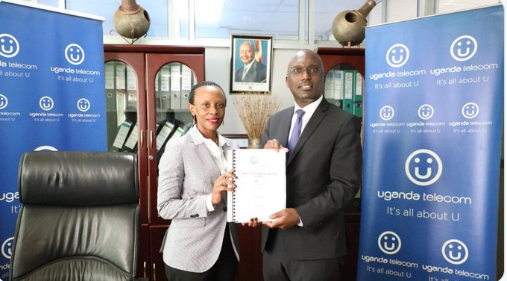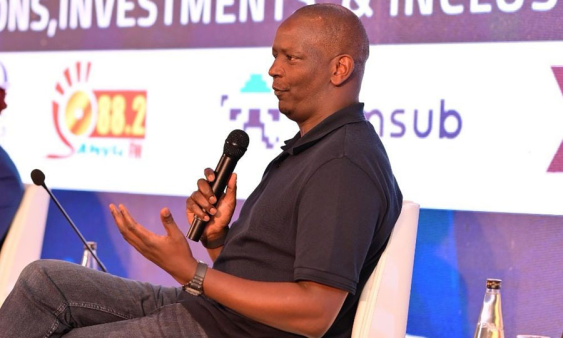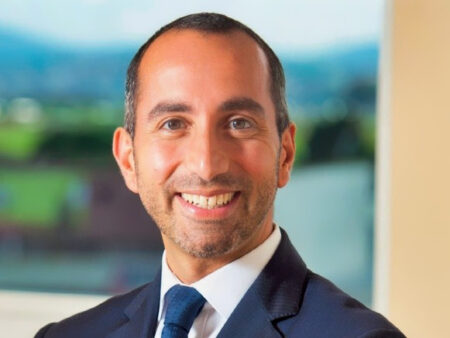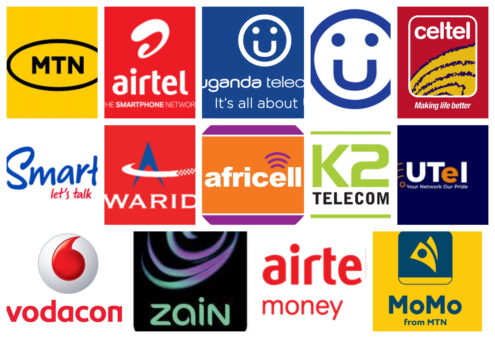Uganda Telecom, the troubled former Libyan and Ugandan governments-owned telco has been sold to a newly formed Uganda government telco at UGX316.4 billion, CEO East Africa Magazine can exclusively reveal.
The sale follows failure by Uganda telecom’s to pay its debts- amounting to over UGX668 billion, prompting it to be entered into insolvency, and subsequently progressed into administration in April 2017.
Before being entered administration, Uganda Telecom Limited (UTL) was 69% owned by Ucom, a Libyan government company and 31% by the government of Uganda (GOU). Following the 2011 overthrow of then Libyan President, Col Muammar al-Qaddafi, and the subsequent political vacuum, coupled with the government of Uganda’s failure to recapitalise the company, saw Uganda Telecom lose market share as well as sink into a financial crisis.
It is also believed that the Government of Uganda frustrated efforts by Ucom to restructure the company, prompting the Libyans to cut off all funding as well as direct all its directors on the Board to resign further escalating the telco’s problems. The fallout would also lead to the resignation of Ali Amir, the then-Libyan Managing Director. Mark Shoebridge, the then Chief Fixed Services Officer was appointed Managing Director in March 2015.
Persistent bad governance, poor cashflows and an obsolete network caused by years of underinvestment, exacerbated by government officials meddling in the running of the company, precipitated the telco’s challenges. Liabilities— mainly supplier debts and statutory obligations, choked the business. By 2017, the company’s liabilities were said to be UGX700 billion, compared to UGX148 billion in assets. Faced with threats of liquidation by creditors and a persistent failure to meet its daily financial obligations, and deserted by customers, the telco was declared insolvent and put under administration in April 2017.
Mr. Twebaze Bemanya the former Registrar General of the Uganda Registration Services Bureau (URSB) was appointed as the first administrator.
Administration is a court-led process, provided for under the Insolvency Act, of 2011. An administrator is appointed and confirmed by Court to run the affairs of the company. Administration means that the company and its shareholders, have failed to meet their financial obligations and an administrator is appointed to take care of creditors that the company has failed to pay. An administrator is supposed to work independently of the shareholders.
However, even after the appointment of an Administrator, Hon Evelyn Anite, the Minister of State for Privatization & Investment under whose docket the shareholding of Uganda Telecom fell, continued to interfere with the Administrator. A nasty public spat ensued between Bemanya and the minister, over a number of issues, but most prominently the sale of the company.
An Anite-preferred Mauritius Telecom, which had sent in a bid to buy 69% of the shares owned by Ucom at a price of USD45 million with a further pledge to infuse at least USD100 million was passed over for a Bemanya-preferred Teleology Holdings Ltd. Teleology, a Nigerian company offered to pay USD71 million. On winning the bid, Teleology was required to pay a non-refundable USD7 million within a month of receiving the offer and to pay up the balance, within two months. By April 2019 Teleology had failed to raise the required amount, and they were booted.

Subsequently, following the botched Teleology deal, it appears, Anite was vindicated, and President Museveni forced Bemanya to stand down as an Administrator, apparently, over his failure to work with Hon. Anite.
Ruth Sebatindira, a lawyer and Partner at Ligomarc Advocates, one of Uganda’s leading law firms, was appointed as the new Administrator in January 2020.
Details of the UGX316.4 billion deal
Following the failed sale, the new administrator went back to the drawing table and convinced the government of Uganda to commence the revival of Uganda Telecom alone through the formation of a new entity that would make a fresh bid for the struggling telco.
The fresh direction was boosted by another unrelated development, when in October 2020 government of Uganda attempted to borrow USD650 million from the Trade and Development Bank (TDB). TDB, as a precondition, asked government to first settle an outstanding loan that Uganda Telecom had with TDB, since the government was a shareholder in the telco.
A subsequent report by the Parliament’s Budget Committee scrutinising the borrowing proposal recommended that government pays the debt, in exchange for increased equity in Uganda Telecom.
The government paid USD15,643,151.25 to TDB.
Subsequently, a new company― Uganda Telecommunications Corporation Limited (UTCL) was incorporated on 8th April 2021 to start preparing the process of buying Uganda Telecom. UTCL is fully owned by the government of Uganda, with the Minister of Finance holding 60% and the Minister of ICT & National Guidance, holding 40%.
UTCL gave an offer to the administrator and on the 23rd February 2022, an Asset Sale and Purchase Agreement was entered between UTCL and UTL wherein UTCL acquired all the assets and business of Uganda Telecom.
Under the deal, UTCL would pay UGX256,892,142,642 over and above the USD15,643,151.25 it had already paid to TDB. This brings the total value of the deal to about UGX316,455,270,323 or approximately USD 81.3 million.
An audit carried out by the Office of the Auditor General showed that Uganda Telecom, as of June 30th 2021, had non-current assets worth UGX184 billion. Additionally, Uganda Telecom’s 9.13% shareholding in a sub-sea internet cable company- the West Indian Ocean Cable Company (WIOCC) was valued at UGX55.45 billion. The Auditor General also said that the telco had 11 properties worth UGX.57.5 billion whose ownership was, however, contested by Uganda Telecom’s sister companies i.e. Posta (U) Ltd, Uganda Broadcasting Corporation (UBC), and other entities.
Uganda Telecom also had UGX 113.65 billion in uncollected debts.
All the above assets added together are equivalent to approximately UGX410.6 billion.
The new company however does not assume any of the old debts by Uganda Telecom, reported by the Auditor General to be about UGX 668 billion, as of 30th June 2021.
The creditors will be paid from the UGX316.4 billion sale proceeds- which is just a small portion of the total indebtedness.
The biggest chunk of the debt is in pension liability to former Uganda Posts and Telecommunications Corporation employees (UGX165,048,246,917) and an assortment of largely private sector creditors, whom the telco owes UGX63,079,412,417. Other creditors include Uganda Revenue Authority (UGX9,786,780,845), Uganda Communications Commission (UGX62,469,304,749), Uganda Communication Employees Contributory Pension Scheme (UGX2,353,904,321) and National Social Security Fund (UGX15, 462, 575,874).
However, the telco owes several other creditors, up to UGX336.3 billion, but this is still in court, pending determination. Another debt of UGX28.7 billion, the Auditor General could not verify, apparently due to “insufficient information”.
However, the transfer of these assets is pending authorisation of the regulator― Uganda Communications Commission (UCC) and the full payment of the full purchase price by UTCL’s shareholders.
CEO East Africa Magazine understands that over and above USD15,643,151.25 paid to TDB, the government has only paid 28% of the UGX256,892,142,642. The balance, according to our sources, the Ministry of Finance, Planning and Economic Development have committed to giving a letter of undertaking.
“Once the letter is issued by the minister, showing when the government will clear the balance, it will be presented to court, so court can okay the transfer of the assets. This will also mark the end of the administration process,” said the source.
The government would then start the process of fully setting up UTCL and transitioning from Uganda Telecom.

 Letters to My Younger Self: Winnie Nakimuli—"You Are Worthy Simply Because You Exist"
Letters to My Younger Self: Winnie Nakimuli—"You Are Worthy Simply Because You Exist"


